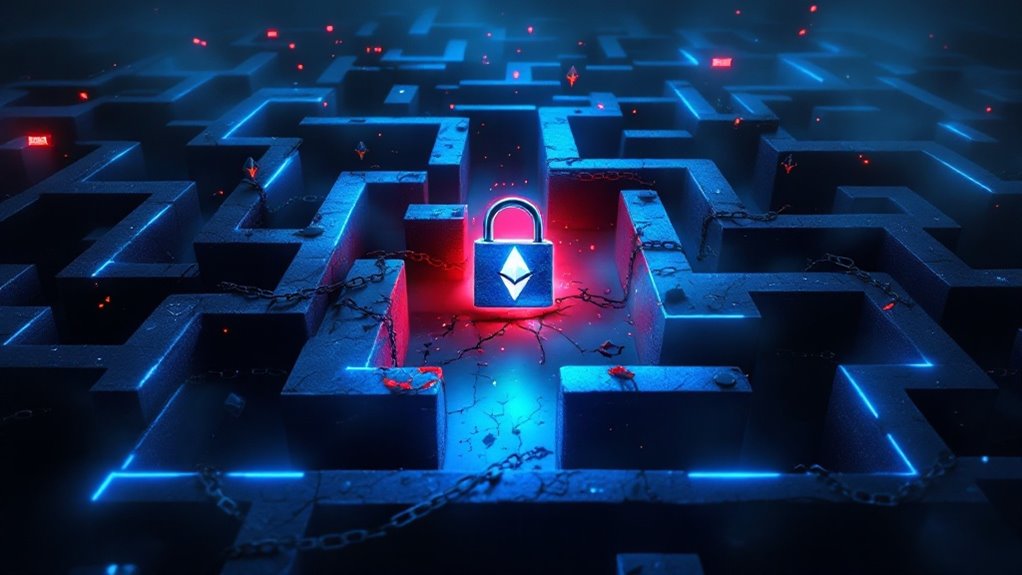DeFi's alluring promise of financial freedom comes with sobering risks that demand careful navigation. While smart contracts enable revolutionary peer-to-peer transactions, they've also led to over $12 billion in losses through hacks and vulnerabilities. High yields often mask complex dangers like impermanent loss and oracle manipulation, while regulatory uncertainty adds another layer of complexity. The DeFi community is strengthening defenses through audits and education, but investors must understand that this digital frontier requires both enthusiasm and vigilance.

The rapid ascent of Decentralized Finance (DeFi) has liberated unprecedented financial opportunities, but beneath its gleaming promise lurks a complex web of risks that demands careful steering.
Like a double-edged sword, DeFi's innovative spirit brings both revolutionary potential and significant dangers, with smart contract vulnerabilities standing as a prime example. The 2016 DAO hack, which resulted in a staggering $50 million loss, serves as a sobering reminder of how seemingly minor coding errors can trigger devastating consequences. Bug bounty programs have become essential tools for discovering vulnerabilities before malicious actors can exploit them.
The DeFi landscape is particularly treacherous when it comes to security breaches and financial risks. Users have lost over $12 billion to theft and fraud, with losses accelerating at an alarming rate – jumping from $1.5 billion in 2020 to $10.5 billion in 2021. Protocols without comprehensive third-party audits frequently become targets for devastating attacks. Smart contracts on platforms like Ethereum enable direct peer-to-peer transactions without traditional banking intermediaries.
DeFi's explosive growth comes with a stark warning: billions lost to scams and hacks, with annual losses surging sevenfold in just one year.
Like moths drawn to a flame, investors are often lured by high yields without fully comprehending the underlying risks of impermanent loss or complex token mechanics.
Oracle manipulation presents another shadowy threat, as demonstrated by the 2020 bZx protocol exploit. These digital bridges between blockchain and external data can be manipulated like puppet strings, causing systemic failures that ripple through the entire ecosystem.
Fortunately, decentralized oracle networks and time-weighted average pricing mechanisms now act as protective shields against such manipulation attempts.
The regulatory landscape resembles a foggy battlefield where innovation clashes with compliance. As regulators gear up for their first seven-figure penalties against DeFi arrangements in 2024, the industry stands at a significant crossroads.
The challenge lies in crafting a balanced framework that nurtures innovation while addressing legitimate concerns about security and accountability.
Amid these challenges, the DeFi community isn't standing still. Through rigorous code audits, hardware wallet adoption, and educational initiatives, stakeholders are working to fortify the ecosystem's defenses.
Like a young city building its walls while growing, DeFi is simultaneously expanding and strengthening its foundations. The key to survival lies in understanding these risks and implementing appropriate safeguards while steering through this evolving financial frontier.
Frequently Asked Questions
How Can I Calculate Potential Returns on My Defi Investments?
Potential DeFi returns can be calculated using basic ROI formulas, annualized ROI calculations, and consideration of protocol-specific metrics like TVL, yield rates, and token appreciation while factoring in associated investment risks.
What Insurance Options Exist to Protect My Defi Assets?
DeFi insurance providers like Nexus Mutual, InsurAce, and Bridge Mutual offer protection against smart contract failures, stablecoin depegs, protocol exploits, and exchange risks through crypto-backed policies with automated claim payouts.
Which Defi Platforms Have the Strongest Security Track Record?
Aave and MakerDAO have demonstrated the strongest security records with no major exploits since launch. Uniswap and Compound follow closely, each maintaining robust security through regular audits and battle-tested smart contracts.
Can Traditional Financial Advisors Help With Defi Investment Strategies?
Traditional financial advisors can assist with DeFi strategies, but most need additional education in blockchain technology. Partnering with DeFi specialists and staying updated on industry developments helps provide thorough investment guidance to clients.
How Do Tax Regulations Apply to Defi Lending and Yield Farming?
DeFi lending interest earnings are taxed as ordinary income, while yield farming rewards face taxation upon receipt. Both activities require detailed transaction records, with capital gains considerations for token swaps and liquidation events.









